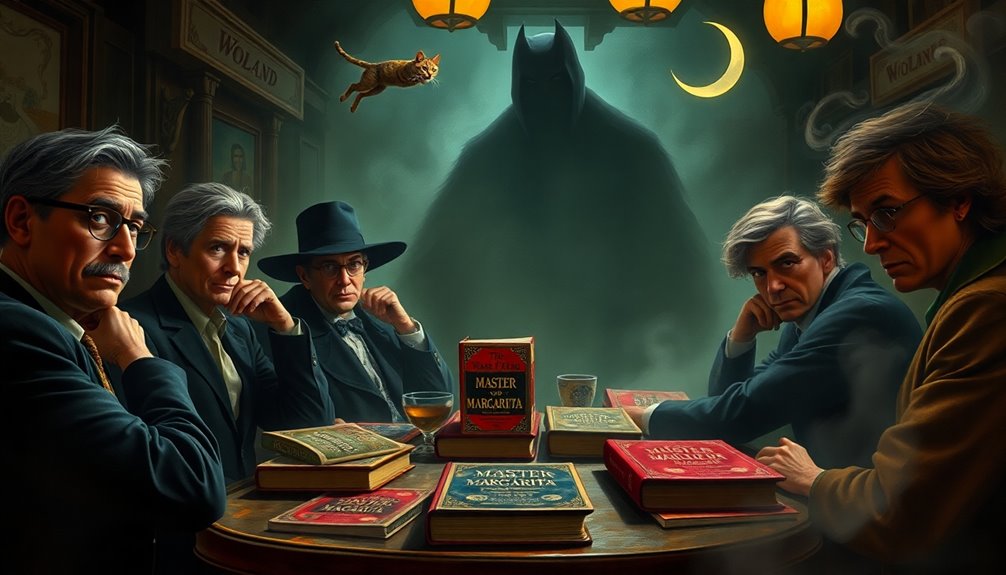If you're curious about "The Master and Margarita," you're in for a treat. This surreal novel by Mikhail Bulgakov weaves together fantasy, romance, and satire in a unique blend that critiques societal norms. Its themes of good versus evil and the struggle for freedom resonate deeply, especially in its portrayal of characters like Woland and Margarita. Over time, the book has evolved from a controversial Soviet piece to a celebrated classic, inspiring modern adaptations. You'll discover intriguing interpretations and insights that continue to spark discussions about identity and morality, inviting you to explore its layers further.
Overview of the Novel
When you plunge into "The Master and Margarita," you're stepping into a rich tapestry of fantasy and reality intertwined.
This novel, penned by Mikhail Bulgakov, showcases an intricate narrative structure that shifts between 1930s Moscow and ancient Jerusalem.
You'll encounter a delightful mix of satire, romance, and supernatural elements, all influenced by various literary traditions, including Russian folklore and Western literature. Dickens' works, like "David Copperfield," similarly blend social commentary with engaging storytelling to reflect on human experiences.
The story unfolds through multiple perspectives, enhancing your experience as you navigate the lives of its compelling characters.
Bulgakov's masterful blending of the absurd and the profound invites you to reflect on the nature of good and evil, making each page an exploration of both personal and societal dilemmas.
You'll find yourself captivated by its depth and complexity. Additionally, the novel's exploration of themes of betrayal resonates with similar motifs found in historical mysteries like "The Lost Apothecary."
Major Themes Explored
As you explore the intricate narrative of "The Master and Margarita," you'll encounter several major themes that resonate throughout the story.
One of the most prominent is the conflict of good vs. evil, which unfolds as the characters navigate a morally ambiguous world. You'll see how Woland, the devil figure, challenges societal norms, forcing characters to confront their own ethics and beliefs. This theme echoes Coates' exploration of systemic racism in "Between the World and Me," where the moral complexities of society are similarly examined. The moral dilemmas faced by characters in the novel reflect the historical context of resistance movements against tyranny, illustrating the ongoing struggle between light and darkness.
Additionally, love's complexity is woven into the fabric of the narrative, portraying relationships that are both transcendent and flawed. The passionate bond between the Master and Margarita showcases how love can triumph over adversity yet also reveal the darker sides of human nature. This duality invites you to reflect on the nuances of love and morality in your own life. Furthermore, the story serves as a critique of totalitarian regimes that highlights the fragility of individual freedom and the importance of resisting oppression.
Character Analysis
The characters in "The Master and Margarita" serve as vivid representations of the thematic complexities within the narrative.
Woland's duality, embodying both chaos and control, challenges your understanding of good and evil. He's not merely a villain; he's a catalyst for change, exposing the hypocrisy of society. His role highlights the delicate balance between hope and despair that shapes characters' decisions and actions.
On the other hand, Margarita's transformation is profound. Initially trapped in a mundane existence, she embraces her desires and becomes a powerful figure. Her journey symbolizes liberation and the search for identity, showcasing her strength against oppressive forces. This evolution mirrors the resilience and hope found in characters' journeys, confronting adversity with courage and determination.
Together, these characters navigate a surreal landscape, prompting you to question morality and the essence of love. Through their experiences, you uncover the intricate layers of Bulgakov's masterpiece. The narrative also highlights themes of betrayal and deception that resonate throughout the story.
Critical Reception Over Time
When you look at the critical reception of "The Master and Margarita," you can't ignore its initial controversy and censorship in the Soviet Union. Over time, its literary importance has evolved, leading to a broader appreciation of its themes and style. Today, modern adaptations and interpretations continue to keep the discussion alive, showing just how timeless this work truly is. Additionally, the novel's exploration of ethical dilemmas resonates with contemporary discussions about morality and power in society. The enduring themes of systemic oppression found in the work highlight the struggles against authoritarianism and the quest for identity in challenging societal conditions. The narrative's exploration of friendship and self-discovery mirrors the transformative journeys of its characters, inviting readers to reflect on their own growth.
Initial Controversy and Censorship
Although "The Master and Margarita" is now celebrated as a literary masterpiece, its initial reception was fraught with controversy and censorship.
The Soviet regime viewed the novel's themes—religion, love, and political satire—as dangerous, leading to significant censorship effects. Many passages were altered or omitted, stifling the author's true voice and vision.
As a result, readers and critics faced a literary backlash, questioning the integrity of the work and its availability. Some praised it despite the censorship, while others lamented what was lost in translation.
This turbulent beginning set the stage for future appreciation, but it also highlighted the struggle between artistic expression and authoritarian control.
The novel's eventual rise to prominence reflects its resilience against those early challenges.
Evolving Literary Importance
As readers began to revisit "The Master and Margarita" in the years following its initial publication, its literary importance evolved considerably.
Initially viewed through the lens of censorship, it soon gained recognition for its rich narrative and complex themes.
You'll notice that scholars and critics began to appreciate its blending of fantasy and reality, reflecting the struggles of the Soviet era.
This literary evolution highlighted its cultural significance, allowing it to resonate with new generations.
The novel's exploration of good and evil, love and betrayal, and the absurdity of life transcended its time, making it a timeless classic.
You might find that today, it's celebrated not just as a Soviet work, but as a universal tale that speaks to the human condition.
Modern Adaptations and Interpretations
While many classic novels fade into obscurity, "The Master and Margarita" continues to inspire modern adaptations that reinterpret its themes for contemporary audiences.
You'll find various theatrical adaptations that bring Bulgakov's surreal narrative to life, each offering unique takes on the intricate dynamics of love, power, and morality.
From avant-garde productions to more traditional performances, these interpretations resonate with today's societal issues, making the text feel significant again.
Artists and directors often inject their visions, resulting in a rich tapestry of artistic interpretations that challenge and engage viewers.
As you explore these adaptations, you'll see how they breathe new life into the story, proving that "The Master and Margarita" remains an essential part of literary and cultural discourse.
Impact on Literature
The impact of "The Master and Margarita" on literature is undeniable, as it weaves together fantasy, reality, and philosophical inquiry in a way that challenges conventional storytelling.
You'll find its literary influence reverberating through various genres, inspiring writers to experiment with narrative style and structure. The novel's rich symbolism encourages readers to uncover deeper meanings, akin to the use of symbolism in Life of Pi.
Bulgakov's ability to blend satire with the surreal encourages you to explore deeper themes in your own writing.
The novel's unconventional approach invites you to question authority and the nature of evil, prompting a unique dialogue between reader and text.
This rich tapestry of ideas not only shapes the works that follow but also cultivates a more adventurous spirit in literature.
You can see its legacy in contemporary narratives that embrace complexity and ambiguity. The exploration of identity and duality in "The Master and Margarita" resonates with readers and writers alike, further enriching the literary landscape.
Modern Interpretations
Modern interpretations of "The Master and Margarita" reveal its timeless relevance and adaptability to contemporary themes.
You'll notice how the novel's postmodern influences resonate in today's literature, blending reality with the surreal. Many adaptations highlight the chaotic interplay between good and evil, reflecting current societal dilemmas.
In film and theater, directors utilize magical realism to capture the fantastical elements, making the story accessible to new audiences. This technique mirrors the theme of acts of defiance found in other narratives, emphasizing the courage to resist oppression. Additionally, the narrative's exploration of systemic racism showcases how deeply entrenched societal issues continue to persist and evolve.
You might see familiar motifs, like the struggle for individual freedom against oppressive systems, mirrored in modern political contexts.
These fresh perspectives invite you to explore the narrative's depth, encouraging discussions about morality, power, and the human experience. Furthermore, the themes of healing and empowerment resonate deeply within the narrative, inviting readers to reflect on their own journeys.
Conclusion
In "The Master and Margarita," the intertwining stories symbolize the eternal struggle between good and evil, echoing through time. As you close the book, you can't help but feel the weight of its themes linger. Like the moonlight that dances on the Moscow streets, the novel reflects your own conflicts and desires. It urges you to question reality and embrace the absurd, reminding you that even in darkness, there's a flicker of hope waiting to be found.



